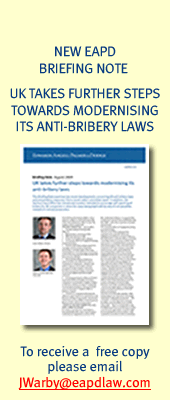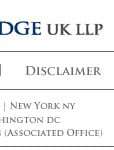

Special Focus
UK: Leading the Fight Against Corruption?
A Bribery Bill was presented to Parliament by Jack Straw in March 2009. The Bill, if enacted, would modernise an area of criminal law that is widely seen as badly past its sell-by-date. With the Bill containing, amongst other things, a new corporate offence of negligently failing to prevent bribery, companies must sit up and take note.
The Bribery Bill May Bring UK Anti-bribery Law into the Twenty-First Century
The present UK bribery law is often criticised for being uncertain and ineffective. Companies that have robust systems to prevent corrupt practices are put at a competitive disadvantage, as their less scrupulous competitors go unpunished.
The UK has been reproached for failing to comply with its obligation to tackle corruption under international law. The OECD Working Group against bribery has singled out the UK for failing to implement a comprehensive or effective enforcement regime.
The poor record of the UK contrasts with the more impressive achievements of other countries. Indeed, many international companies that operate in the UK are putting anti-bribery systems, procedures and controls in place with an eye more to complying with the US Foreign Corrupt Practices Act than with any domestic laws.
None of these points detract from the fact that British business enjoys a very good reputation, and that only a minority of companies engage in corrupt activities. However, inadequate compliance programmes leave many vulnerable to corruption.
An Introduction to the New Bribery Offences
The Bill, broadly speaking, proposes four new criminal offences, two of which are general in scope and two of which are more specific. The general offences are:
- uesting or receiving a bribe.
The more specific offences are:
- a commercial organisation negligently failing to prevent bribery.
All the offences capture situations in which a bribe was made to or through a third party. The offences are not confined to bribes made or accepted in the UK, but extend to bribes made or accepted by British citizens and companies throughout the world.
The penalties for committing any of these offences are severe: on indictment, an individual would face up to ten years imprisonment and an unlimited fine, and a company would face an unlimited fine.
A Position of Trust and Responsibility
The general offences of bribery could only be committed in certain circumstances, narrowly defined by the Bill. These circumstances involve a person performing a function in a position of trust and responsibility.
First, the position has to relate to public office, business or employment (or to the affairs of a company, partnership or club, etc). Secondly, it must be expected of a person in that position that they will perform their function in good faith, impartially or in a position of trust. If either of these pre-conditions is not satisfied then there is no position of trust and responsibility, making it impossible to commit an offence.
Cases of Bribing and Being Bribed
The Bill is formulated in an unusual way: the proposed offences are expressed as scenarios, which the Bill terms 'cases'.
The formulations of the offence are complex, and perhaps excessively so, although this is a consequence of the need to ensure that the Bill captures all of the widely differing ways in which bribes are made or received.
The offences relating to bribing another person are expressed in two cases, so that an offence would be committed if:
- the defendant offers, promises or gives a financial or other advantage intending to induce another person to perform improperly one of their functions in their position of trust and responsibility, or as a reward for improper performance; or
- the defendant offers, promises or gives a financial or other advantage to another person, knowing or believing that the acceptance of the advantage would itself constitute the improper performance of one of their functions in their position of trust and responsibility.
The offences relating to being bribed are expressed in four cases, so that an offence would be committed if:
- the defendant requests, agrees to receive or accepts a financial or other advantage intending that one of their functions in their position of trust and responsibility should in consequence be performed improperly;
- the defendant requests, agrees to receive or accepts a financial or other advantage, where the request, agreement or acceptance itself constitutes the improper performance of one of the functions in their position of trust and responsibility;
- the defendant requests, agrees to receive or accepts a financial or other advantage as a reward for the improper performance of one of their functions in their position of trust and responsibility; or
- the defendant performs one of their functions in their position of trust and responsibility improperly in anticipation or in consequence of the receipt of a financial or other advantage.
These cases are clearly designed to capture a wide range of behaviour, so that no corrupt activities slip through the net. There has, however, been criticism that the net is drawn too widely, and that much behaviour, which would not normally be understood as corrupt, would technically be constituted an offence.
Bribing a Foreign Public Official
The stand-alone offence of bribing a foreign public official has been included so that the UK can demonstrate compliance with its international legal obligations (specifically with the OECD Convention on Combating Bribery in International Business Transactions). Having the stand-alone offence is intended to make it easier for the courts to develop the law against the changing background of the OECD Convention.
The Corporate Offence of Negligently Failing to Prevent Bribery
It would technically be possible for a company to commit one of the bribery offences outlined above. This would occur if an individual who was part of the company's 'controlling mind' (i.e. one of the company's very senior officers) committed the offence. However, it is notoriously difficult to prosecute companies on this basis and there has never been a successful prosecution in England of a company for bribery. The OECD Working Group, in its October 2008 report, stated that the United Kingdom had not effectively criminalised bribery by companies.
This is one reason for the introduction of a new offence, which could be committed by any company or partnership which carries on business within the jurisdiction. A company could be prosecuted whether or not criminal proceedings were brought against those involved in paying the bribe.
The offence would, in effect, require commercial organisations to implement rigorous anti-bribery systems, and to keep them under review.
A defendant commercial organisation would commit an offence if:
- a person working for or on behalf of the defendant (including an employee, agent or subsidiary) bribes another person; and
- the bribe was in connection with the defendant's business; and
- any person with responsibility for preventing bribery negligently failed to prevent the payment of the bribe.
The defendant would be able to escape liability by showing that adequate procedures had been implemented with the intention of preventing bribery by the person paying the bribe, a new form of defence. However, having adequate procedures in place would not be a defence if a senior officer of the defendant had been negligent in failing to prevent the bribe.
Criminal liability should be avoided through the defence if a properly trained but fraudulent employee found a way to circumvent adequate compliance procedures. Companies or partnerships without adequate training and systems in place are clearly at significant risk of prosecution if one of their workers pays a bribe.
The offence avoids automatically imposing criminal liability on companies for bribery by their workers, as is the case for example in the United States. Such an approach has traditionally been taken in England only in relation to less serious wrongdoing.
European Union law, implemented in the UK, provides for mandatory exclusion (debarment) of a company from public sector contracts if the company, or its directors or certain other representatives, have been convicted of bribery or fraud. It is unclear whether conviction for negligently failing to prevent bribery would lead to mandatory debarment. Because of the mandatory nature of the sanction, and the draconian effect it would have on certain businesses, which might be disproportionate to the seriousness of the offence committed, it would not seem appropriate for it to apply to a business that has merely been 'negligent' in preventing bribery (the present law on debarment already has substantial deficiencies, not least that no account is taken of mitigating factors).
There is also a question mark over the extent and content of the anti-bribery systems that the organisation would have to implement in order for them to be viewed as 'adequate'. There have been calls for official guidelines to set out the components of an 'adequate' compliance regime, so that commercial organisations can enjoy certainty with regard to the costs of compliance.
A director or senior officer who consented to or connived at one of the general offences would, under the Bill, also be personally liable for the offence.
The Problem of Facilitation Payments
Facilitation payments are payments made to induce a person to perform a duty which that person is already obliged to perform, without resulting in preferred treatment, and where the payment exceeds that properly due.
The criminalisation of true facilitation payments is a matter of some debate. Demands for facilitation payments are customary in some countries, and the person from whom the payment is demanded is often the victim of extortion. The making of facilitation payments is at present a criminal offence in England, in common with many jurisdictions but with the notable exception of the United States.
The Bill criminalises facilitation payments, both under the general offences and also under the specific offence of bribing a foreign public official. However, it has been suggested that prosecutions will only rarely be brought.
If the Bill is enacted, companies would welcome clear guidance describing the circumstances in which a facilitation payment would be prosecuted, and the circumstances in which it would not.
Comment
Whilst there is scope for improvement in the drafting of the Bill, implementation of the present draft would make UK bribery law clearer and simpler.
Robust anti-bribery systems would effectively be made a legal requirement. Vigorous enforcement by the US Department of Justice and Securities Exchange Commission of the US Foreign Corrupt Practices Act against both domestic and foreign companies already makes the implementation of such systems essential for any company trading internationally.
UK law enforcement agencies are already increasingly prioritising the investigation and punishment of bribery, as demonstrated by recent successes for the Serious Fraud Office and the Financial Services Authority. That will continue with the enactment of the proposed bill. So whilst the UK may not yet be leading the fight against corruption it has certainly started lacing up its gloves.
Contacts
The information in this newsletter is for general guidance only and is not intended to be a substitute for specific legal advice. If you would like any further information please contact:

James Maton
Partner, Commercial Litigation - London
t: +44 (0) 20 7556 4547
e: JMaton@eapdlaw.com









